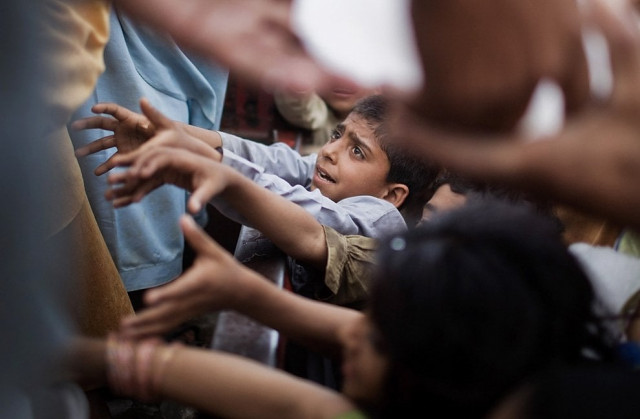Food security: ‘Half of Pakistan’s people are malnourished’
45 percent of the children under the age of five are stunted.

PHOTO: REUTERS
“Half of Pakistan’s population is malnourished… more than 58 per cent is food insecure,” Islamia University of Bahawalpur (IUB) Vice Chancellor Muhammad Mukhtar said on Monday.
He was addressing the International Conference on Biochemical and Chemical Sciences organised by the Department of Chemistry and Biochemistry at the University of Agriculture, Faisalabad (UAF).
He said Pakistan was among the three countries that accounted for half of all malnourished women and children in the world.
Mukhtar, who was also the chief guest on the occasion, urged the scientists to play their key role in ensuring food security which is “one of the major challenges for the country.”
“Pakistan has a strong ecosystem and has a good cropping system… If the youth are provided quality education there is no reason the country won’t progress,” he said.
The IUB VC said Pakistan should follow in China’s footsteps. He said the people of Cholistan on average lived longer than others in Pakistan. “The factors that lead to their longevity need to be researched,” he added.
UAF Vice Chancellor Iqrar Ahmad Khan said Pakistan was among the countries worst hit by global climate change.
He said the UAF had been ranked 35th among universities by the Universitas Indonesia (UI) GreenMetric World University Ranking.
Khan said the university would continue its environment friendly policies.
Silvia Kaufmann of the International Nutrition Development Partner said as many as 45 per cent of the children below five years of age in the country were stunted owing to chronic malnutrition.
She said 40 to 50 per cent Pakistanis were living below the poverty line. She called for collaborated efforts in this regard. She said that they were working to highlight the nutrition issue in the country.
Kausar Abdullah of the Forman Christian College, Lahore, said collaborations were needed to address the issue of food insecurity.
Faculty of Sciences Dean Muhammad Javed said 50.4 per cent of women were anaemic, 41.3 per cent had vitamin-A deficiency, and 66.8 per cent had vitamin D deficiency, according to National Nutrition Survey.
Saleem Shaheen from the Planning Commission said the world population would reach 9 billion by 2050.
“It will be a challenge to feed it in years to come,” he said.
Muhammad Asghar, the chairman of Department of Chemistry and Biochemistry at the University of Agriculture, Faisalabad said the UAF would continue to take all possible steps to help ensure food security in the country. He said his department had produced 91 PhDs.
Published in The Express Tribune, February 26th, 2014.



















COMMENTS
Comments are moderated and generally will be posted if they are on-topic and not abusive.
For more information, please see our Comments FAQ